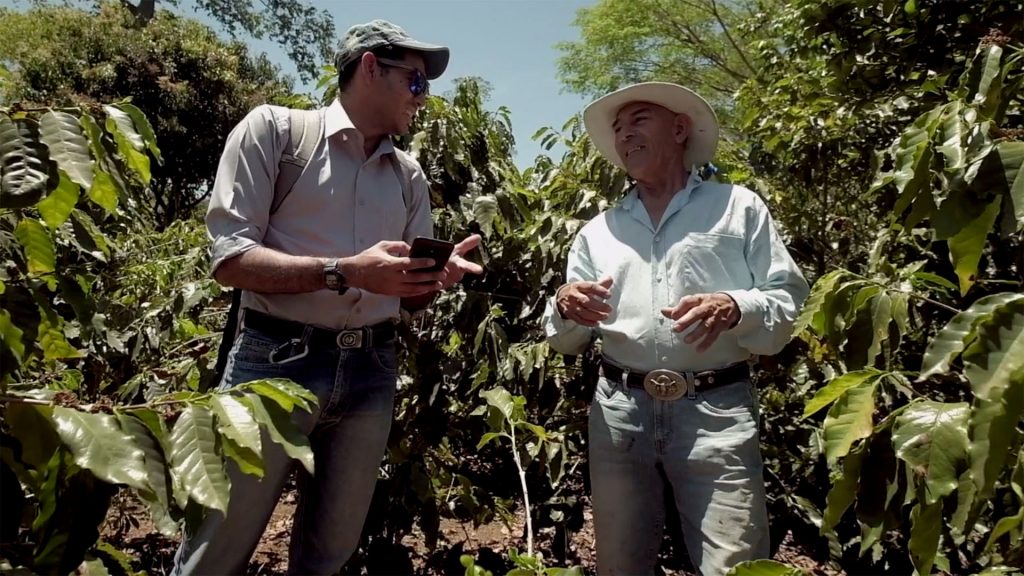Key Takeaway
Information from external data, gleaned from new data sources like satellite imagery, is being used to help assess the sustainable practices of smallholder coffee farms, enabling coffee producers of all sizes to participate in the sustainable coffee market without limiting verification to larger, well-funded organizations.
Enveritas uses insights from new sources of external data to help coffee farmers in remote locations verify whether their coffee beans are being grown using sustainable labour and eco-friendly practices.
Today, in order to establish a brand value and customer loyalty, large multinational companies increasingly want to reassure customers and regulators regarding the sustainability of their coffee supply chains in terms of economic, social and environmental standards. However when it comes to commodities such as coffee, the task is complicated.
As coffee is sourced from millions of smallholder coffee farms around the world, the current system used to verify coffee for sustainability standards is expensive, limited in scope, and requires close oversight to monitor conflicts of interest. Sustainability certification is not accessible to all the smallholder farmers that provide coffee to multinational companies.
We spoke with CEO David Browning about how they look to use external data insights from satellite imagery to democratize access to the sustainable coffee farming industry for all producers.

Verified sustainable
Sustainable coffee isn’t just a fad for caffeine lovers with a thirst for social justice. Several major coffee companies today, including Illy and Starbucks, have launched initiatives that support sustainable coffee, by choosing to purchase beans grown via environmentally friendly farming practices.
Research by the National Coffee Association, an American trade group, concludes that consumers are genuinely concerned about their daily coffee being produced sustainably. This includes combating pollution, using renewable resources, minimising water use during washing, and farming beans in a way that conserves the environment and provides a better livelihood for the people who produce them.
Up to two thirds of 19-24-year-olds surveyed said that they were influenced by ethical certificates found in coffee houses which show that producers have complied with sustainable criteria monitored by organisations such as Fairtrade.
With the demand for sustainable coffee on the rise, feeding the appetite of the socially conscious coffee drinker has become vital for coffee business. However, the majority of coffee farmers are excluded from the high-valued sustainable markets, as the verification process – which considers things like soil conservation, child labour, minimum wage etc.- is prohibitively expensive for a single, unorganized smallholder farmer.
Enveritas enlists the help of satellite data to democratize sustainability verification
At Enveritas, the primary mission is to help all coffee farmers participate in the global sustainable coffee industry – especially smallholder farmers at the base of the pyramid. Enveritas provides sustainability assurance at no cost to farmers, and supply chain actors working with farmers receive data and insights so they can benchmark their practices, undertake continuous improvement, and interpret sustainability results in the appropriate context. This enables producers, buyers and traders to have genuine conversations and a better understanding of challenges in the supply chain.
Browning says, “The traditional solutions works well for large estates, and farmers organised into cooperatives. But many of the world’s coffee farmers have farms less than one hectare in size and are not part of any organized structure. For them, the existing solutions can be more difficult to access.”
To develop an efficient and scalable system, Enveritas uses geospatial analysis and machine learning technology to identify coffee farms via satellite imagery and monitor them remotely for issues like deforestation.
Overall the team evaluates 30 standards which are divided into three categories:
- Social standards look at child labour practices, minimum wage requirements, discrimination issues, access to clean water and decent housing
- Environmental standards check for deforestation, pollution, biodiversity protection, soil conservation, water and energy conservation
- Economic standards cover transparent pricing, forced labour, sustainable production, access to training and finance, among others

The Approach
Browning states, “About 10% of coffee in the world had been certified for sustainability verification, but we’d like the other 90% to be able to participate.” He sees the existing challenges as an opportunity to use machine learning and artificial intelligence to design a solution that works for companies and smallholder coffee farmers.
“By using machine learning, we are able to identify coffee households from satellite imagery, and use that to do a randomised sample selection needed for assurance,” Browning says. “The process offers much more transparency than we had historically. Once we have that randomisation completed and conducted, we generate a population sample using machine learning, and couple the coordinates with GPS and smartphone technology so that we can assure that the surveyor on the ground is actually going to the point (remote farmland) that the program selects. So that reduces a lot time and resources to get people to the right place quickly and efficiently.”
The verification process for sustainable farms includes:
- Landscape monitoring using satellite imagery
- Real time data analytics
- Rigorous empirics
- Actionable insights and assurance for supply chain actors and policy makers
Enveritas also adopts satellite imagery separately to get a sense of the probability of deforestation. Browning says, “With the help of satellite imagery we can look at the change in forest cover over different time periods. So you can pick up whether clearing has occurred from one satellite image to the next. Furthermore it also allows you create a probability heat map of where deforestation might be worse or might be more recent.”
Case Study
Soppexcca Cooperative in Nicaragua
Fatima Ismael, manager at the Soppexcca Cooperative in Jinotega, Nicaragua has used the Enveritas standards as a framework to guide her team’s continuous improvement efforts. They welcome the Enveritas Assurance360 results each year and present the findings and data from the project to their board of directors in order to develop improvement plans.
Since engaging with Enveritas, the Soppexcca team has seen scores increase across the social standards as the results draw attention to specific opportunities they can easily and quickly address, such as improved occupational health and safety and access to training.

Insights from external data
According to Browning, “Valuable insights also come out of our surveying. External data allows for a lot more efficiency, and much more rigor. As an example, one of the challenges historically was that auditors were entrusted with the requirement to take a random sample, but there was limited oversight. External data allows complete transparency/oversight in terms of the selection population and the selection of a random sample. What that means in essence is that we are going to more remote places than historically was the case, as our machine learning models can effectively identify coffee farms from satellite imagery.”
External data allows for a lot more efficiency, and much more rigor
Moving forward: insights from external data
According to Browning, “Valuable insights also come out of our surveying. External data allows for a lot more efficiency, and much more rigor. As an example, one of the challenges with traditional auditing is ensuring that auditors take an appropriate random sample in an environment of limited oversight. External data allows complete transparency/oversight in terms of the population selection and the selection of a random sample. What that means in essence is that we are going to more remote places than historically was the case, as our machine learning models can effectively identify coffee farms from satellite imagery.”
His team believes there is a tremendous scope to explore new use cases for this technology in the future. “We are currently looking at how the program can be used to provide insights for education policy makers in developing countries to help inform decisions for better educational outcomes. For example, can we use machine learning data to understand population density?
“If we can overlay the the location of schools with the location of the populace, we may be able to provide valuable information for policy makers. Do we have the right schools in the right places where people live? Where should we be planning new infrastructure in the future? Where are resources most stretched at present? Where do we need more teachers?
“The goal would be to provide independent, accurate information, using low-cost technology to help governments, and other groups interested in education to make choices and plan for the future. We have only scratched the surface, and there is much more that can be done.”
About David Browning Enveritas CEO
David Browning is the CEO of Enveritas, a non-profit organization that provides sustainability verification for the coffee industry. David previously led TechnoServe’s global coffee practice for 13 years. He also partnered with the Gates Foundation to work with ~200,000 smallholder coffee farmers in East Africa. He has served as a trusted counselor for many of the world’s leading coffee companies on sustainability strategy, and also formerly worked for McKinsey & Company.

